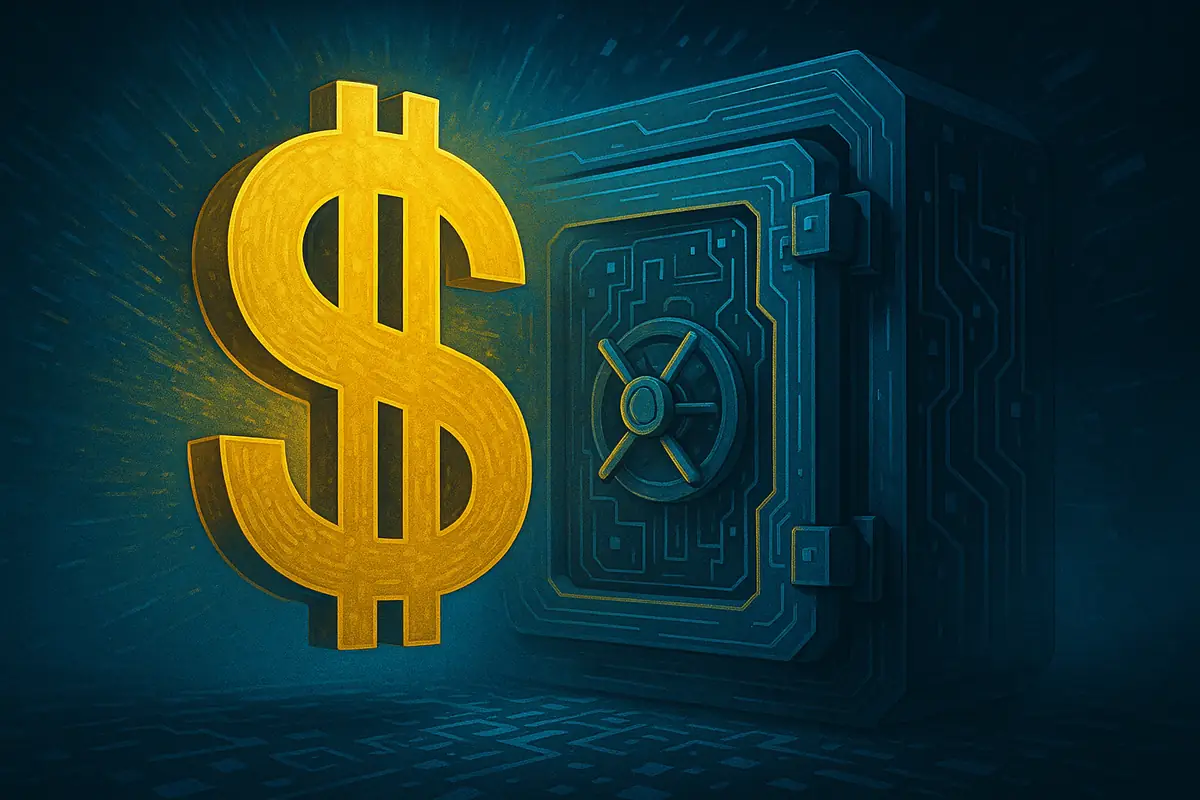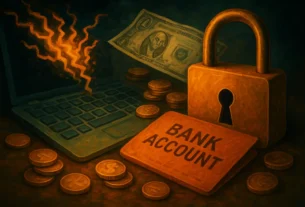In today’s digital age, managing your finances has never been more convenient. Online bank accounts free of fees and unnecessary restrictions are revolutionizing how people save and spend money. Whether you’re looking to escape monthly maintenance charges, avoid minimum balance requirements, or simply want more control over your finances, free online banking offers compelling solutions for virtually everyone.
Lista de Tópicos:
- Why Choose Online Bank Accounts Free?
- Benefits of No-Fee Digital Banking
- Who Should Consider Free Online Accounts?
- Step-by-Step: How to Open an Online Bank Account Free
- Documents You May Need
- Setting Up Without a Deposit
- Best Online Banks with No Fees (2025)
- Open Online Bank Accounts Free – No Credit Check Needed
- Digital Bank Account Free – Pros & Cons
- How to Open a Free Online Bank Account – Summary
- Frequently Asked Questions
- Final Thoughts – Is a Free Online Bank Account Right for You?
The days when banking meant standing in line at brick-and-mortar locations are long gone. With online bank accounts free from traditional constraints, you can manage your money anywhere, anytime, often with better interest rates and fewer fees than conventional banks offer. This comprehensive guide will walk you through everything you need to know about finding, comparing, and opening no-cost digital banking options that fit your specific needs.
Why Choose Online Bank Accounts Free?
The shift toward digital banking continues to accelerate, and for good reason. Online bank accounts free of traditional fees offer numerous advantages over conventional banking relationships. These virtual institutions operate with lower overhead costs, allowing them to pass those savings directly to customers through eliminated fees and better terms. It is also an option for those who struggle financially, and need to Get Out of Debt.
Benefits of No-Fee Digital Banking
Instant access and 24/7 control
Unlike traditional banks with limited operating hours, online bank accounts free you from time constraints. Need to make a transfer at 3 AM? No problem. Want to check your balance during a holiday weekend? It’s always available. This round-the-clock accessibility empowers you to manage your money on your schedule, not the bank’s.
Modern online banking platforms feature intuitive interfaces that make tracking expenses, setting savings goals, and analyzing spending patterns remarkably easy. Many offer personalized insights and automated tools that help you make smarter financial decisions without requiring an accounting degree.
Free online checking accounts No maintenance or overdraft fees
Perhaps the most compelling reason to consider online bank accounts free of traditional constraints is the elimination of pesky fees. Traditional banks often charge monthly maintenance fees ranging from $5 to $15 unless you maintain minimum balances or meet specific transaction requirements. Digital banks typically eliminate these entirely.
Even more significant are the savings on overdraft fees, which average $35 per occurrence at traditional banks. Many online banking options either eliminate these charges completely or offer much more affordable overdraft protection services, potentially saving frequent overdrafters hundreds of dollars annually.
Cashback and debit card rewards
Many online bank accounts free of fees don’t skimp on perks. In fact, digital banks frequently offer more generous rewards programs than their traditional counterparts. These may include cashback on purchases, higher interest rates on deposits, or partnerships with retailers for special discounts.
Some online banks reward everyday spending with up to 2% cashback on specific categories or offer round-up features that automatically save your spare change from purchases. Over time, these small benefits can add up to significant value without requiring any change in your spending habits.
Who Should Consider Free Online Accounts?
Open a digital bank account for students and young professionals
For those early in their financial journey, online bank accounts free from fees provide the perfect starting point. Students and recent graduates typically have limited funds and irregular income patterns, making minimum balance requirements particularly burdensome.
Digital banks often cater specifically to younger users with features like budget tracking tools, savings automation, and educational resources. Many also offer early direct deposit access, allowing students and young professionals to access their paychecks up to two days earlier than traditional banks permit.
No-fee online banking for People with no or poor credit history
Traditional banking relationships often begin with credit checks that can exclude those with limited or damaged credit histories. In contrast, many online bank accounts free you from these barriers by focusing on providing basic banking services without judgment about past financial mistakes.
Second-chance banking options abound in the digital space, allowing individuals to rebuild their financial reputation while still enjoying modern banking conveniences. This inclusivity represents one of the most significant democratizing effects of the fintech revolution.
Best Free Online Bank Accounts for Freelancers and Remote Workers
The gig economy continues to grow, and with it comes unique banking needs. Freelancers and independent contractors benefit tremendously from online bank accounts free of traditional constraints. Features like unlimited transactions, easy invoicing integrations, and the ability to create sub-accounts for tax savings make digital banking particularly attractive for self-employed individuals.
Many online banks also offer reduced or eliminated fees for international transfers, which proves invaluable for remote workers with clients or employers abroad. The combination of lower costs and specialized features makes these services particularly well-suited to modern working arrangements.
Step-by-Step: How to Open a Online Bank Account Free
Getting started with online banking is remarkably straightforward, typically requiring just a few minutes rather than the hours you might spend at a traditional bank branch. Here’s how to navigate the process efficiently:

Documents You May Need
Most online bank accounts free of excessive paperwork still require basic documentation to comply with federal regulations. Typically, you’ll need:
- Valid government-issued photo ID (driver’s license, passport, or state ID)
- Social Security Number or Individual Taxpayer Identification Number
- Proof of address (utility bill, lease agreement, or other official mail)
- Basic personal information (date of birth, email address, phone number)
The verification process usually takes just minutes, with most applicants receiving immediate approval. Some banks may require additional documentation for specific account features or if they cannot verify your identity electronically.
What if you don’t have an ID?
Finding free online bank account without ID can be challenging due to federal regulations requiring banks to verify customer identities. However, some alternatives exist. Certain prepaid debit card accounts offer similar functionality with less stringent documentation requirements, though they may have more limited features.
Some online banking platforms accept alternative forms of identification such as foreign passports or consular identification cards. Others may allow a combination of documents that together establish your identity, even without a traditional government-issued ID.
Setting Up Without a Deposit
How to open an account with no deposit
Many people assume opening any bank account requires an initial deposit, but numerous online bank accounts free from this requirement exist. To find accounts that don’t require upfront money:
- Look specifically for “no minimum deposit” language in account descriptions
- Compare several options that advertise “no opening deposit required”
- Verify there are no hidden fees that activate if you don’t fund immediately
Opening an online bank account free, no deposit required, typically involves completing the standard application and simply skipping the funding step. The account becomes active once your identity is verified, allowing you to set up direct deposits or transfer funds at your convenience.
Banks that don’t require minimum opening balance
The availability of free online checking account no opening deposit options has expanded dramatically. Major online banks competing in this space include:
- Chime
- Capital One 360
- Ally Bank
- Discover Online Banking
- Varo
Each offers slightly different features and benefits, but all share the core advantage of allowing you to establish a banking relationship without any upfront financial commitment. This accessibility represents a significant improvement over traditional banks, which typically require $25 to $100 minimum opening deposits.
Best Online Banks with No Fees (2025)
The landscape of online bank accounts free from fees continues to evolve rapidly, with new entrants and improved offerings appearing regularly. Current leaders in the space combine robust feature sets with truly fee-free structures.
Top 5 Free Online Bank Accounts
Features and comparisons
- Ally Bank – Consistently rated among the best for customer service, Ally offers fee-free checking and savings accounts with competitive interest rates. Their savings account particularly stands out with rates well above national averages.
- Capital One 360 – Combines the online convenience of digital banking with physical branches and cafes in major cities. Their checking account features no fees, no minimums, and access to over 40,000 fee-free ATMs.
- Chime – Pioneer in early direct deposit and automated savings features. Their SpotMe feature allows qualified members to overdraft up to $200 with no fees.
- SoFi – Offers a comprehensive financial ecosystem including checking, savings, investing, and lending products. Their checking account features up to 3.75% APY with qualifying direct deposits.
- Discover Bank – Zero fees across the board, including no NSF fees, and offers 1% cashback on debit card purchases up to $3,000 monthly.
When comparing online bank accounts free of traditional constraints, consider how their specific features align with your personal banking habits and priorities.
Mobile app experience
The quality of mobile applications varies significantly among online banks. Top-rated apps provide intuitive interfaces, robust security features including biometric authentication, and comprehensive functionality that eliminates the need for desktop banking entirely.
Look for features like mobile check deposit, account-to-account transfers, bill pay, and detailed transaction categorization. User reviews in app stores offer valuable insights into reliability and user satisfaction that official marketing materials might not reveal.
ATM access and cashback options
Despite the digital focus, access to cash remains important for many consumers. The best online bank accounts free you from ATM fees through various approaches:
- Proprietary ATM networks (Capital One, Discover)
- ATM fee reimbursements (Ally, Charles Schwab)
- Partnerships with major ATM networks (Chime with MoneyPass)
Some digital banks enhance their appeal with no-fee free checking accounts with cashback debit cards, essentially paying you to use your own money. These programs typically offer 1-2% back on purchases, sometimes with category restrictions or monthly caps.
Best for Cashback Debit
For those seeking to maximize returns on everyday spending, several online bank accounts free from fees offer compelling cashback programs on debit card transactions.
Free checking account – no fee cashback debit
Discover Bank leads this category with a straightforward 1% cashback on all debit card purchases up to $3,000 monthly. Unlike credit card rewards that tempt you to spend borrowed money, these programs reward your regular spending with your own funds.
Other notable options include:
- Oxygen Bank with up to 2% cashback in selected categories
- Current Bank offering points on purchases redeemable for cash or merchandise
- Nerve Banking with special cashback rates for musicians and creative professionals
Free checking account | No-Fee Checking
Beyond cashback, many online bank accounts free from traditional fees offer unique value propositions:
- Albert provides financial guidance alongside basic banking
- Varo combines high-yield savings with early direct deposit access
- One Finance offers creative “pocket” systems for budgeting
Each of these options eliminates monthly maintenance fees while providing specialized features tailored to specific financial preferences and habits.
Open Online Bank Accounts Free – No Credit Check Needed
Credit concerns prevent many Americans from establishing traditional banking relationships. Fortunately, numerous online bank accounts free from credit requirements have emerged to serve this significant market segment.
Options with No Credit or ChexSystems Check
Free online checking account no opening deposit no credit check
Several online banks specialize in providing second-chance banking opportunities:
- Chime doesn’t use ChexSystems and has no credit requirements
- Current focuses on banking features rather than past mistakes
- LendingClub offers “Essential Checking” specifically for those rebuilding banking history
These institutions recognize that past financial difficulties shouldn’t prevent access to basic banking services. Their business models focus on providing value rather than penalizing customers for previous challenges.
Free online checking account no opening deposit with overdraft
For those concerned about occasional cash flow issues, several online bank accounts free from traditional overdraft fees offer innovative alternatives:
- Dave provides up to $500 in overdraft protection without interest
- MoneyLion offers Instacash advances up to $300
- Brigit analyzes your spending patterns to predict shortfalls and offer proactive advances
These services typically charge much lower fees than traditional overdraft protection and often provide grace periods for repayment without penalties.
Digital Bank Account Free – Pros & Cons
While online bank accounts free from traditional fees offer compelling advantages, they’re not without potential drawbacks. Understanding both sides ensures you make an informed decision aligned with your financial needs.
Are Digital Banks Safe?
Security represents a primary concern for many potential online banking customers. It’s important to understand that legitimate digital banks employ the same encryption and security measures as traditional institutions. Additional reassurance comes from:
- FDIC insurance (typically through partner banks) protecting deposits up to $250,000
- Regulation by the same federal authorities overseeing traditional banks
- Multi-factor authentication and biometric security features
In many ways, digital bank account free services actually offer enhanced security through instant transaction alerts, card freezing capabilities, and granular control over where and how your card can be used.
Difference Between Online and Traditional Accounts
Digital bank account free
The fundamental difference lies in the business model. Online banks operate without physical branch networks, allowing them to:
- Eliminate overhead costs associated with maintaining buildings
- Reduce staffing requirements for in-person transactions
- Invest more in technology and customer experience
- Pass savings to customers through eliminated fees and better rates
These structural advantages allow online bank accounts free from traditional constraints to offer genuinely different value propositions rather than simply cheaper versions of conventional banking.
Online checking account with no fees
Beyond structural differences, online checking accounts typically offer:
- More user-friendly mobile experiences
- Faster payment processing
- More innovative budgeting and saving tools
- Better integration with digital financial ecosystems
Traditional banks continue catching up in digital capabilities, but their legacy systems and business models often prevent them from matching the nimbleness and innovation of digital-first institutions.
How to Open a Free Online Bank Account – Summary
Opening online bank accounts free from traditional hassles typically takes just minutes. Here’s a condensed process most digital banks follow:
- Choose a bank that aligns with your specific needs and priorities
- Visit their website or download their mobile app
- Click “Open Account” or “Get Started”
- Provide basic personal information (name, address, birthdate, etc.)
- Submit identification documentation for verification
- Set up security features like passwords and security questions
- Link external accounts for initial funding (if desired)
- Download the mobile app and set up notifications
The entire process typically completes within 5-10 minutes, with most people gaining immediate access to their new account.
Quick Checklist for Opening
Before applying, ensure you have:
- Stable internet connection
- Valid email address and phone number
- Government-issued ID readily available
- Social Security Number or ITIN
- Information about any external accounts you wish to link
Having these items prepared streamlines the application process and prevents frustrating interruptions.
What to Avoid When Choosing a Bank
What is a free no-fee checking account?
True online bank accounts free from charges should avoid:
- Monthly maintenance fees
- Minimum balance requirements
- Overdraft fees (or offer affordable alternatives)
- ATM withdrawal charges
- Paper statement fees
- Account closure fees
- Inactive account fees
Reading the fee schedule carefully before opening an account prevents unpleasant surprises later. Some “free” accounts actually impose fees under specific circumstances, so understanding the complete terms remains essential.
Frequently Asked Questions
Can I open a free online bank account without ID?
Federal regulations require banks to verify customer identities, making it difficult to open accounts without any identification. However, some institutions accept alternative documentation like foreign passports or combinations of non-photo IDs. Prepaid debit card accounts sometimes offer more flexible requirements while providing similar functionality.
What if I have bad credit?
Many online bank accounts free from credit requirements exist specifically for those with credit challenges. These second-chance banking options focus on providing basic services without judgment about past financial difficulties. Look specifically for banks that advertise “no credit check” or “second chance” accounts.
Are there free checking accounts with debit cards?
Virtually all online bank accounts free of fees include debit cards. These cards typically work on major networks like Visa or Mastercard and function identically to cards from traditional banks. Many digital banks even offer instant virtual card issuance, allowing you to begin using your account immediately while waiting for the physical card to arrive.
Can I get overdraft protection with free accounts?
Yes, many online bank accounts free from traditional fees offer innovative overdraft alternatives. These range from fee-free overdraft coverage up to certain limits (typically $100-$200) to early wage access features that help prevent overdrafts entirely. These solutions typically cost significantly less than traditional overdraft protection programs while providing similar or superior functionality.
Final Thoughts – Is a Free Online Bank Account Right for You?
Online bank accounts free of traditional constraints offer compelling advantages for most consumers. Their combination of eliminated fees, enhanced convenience, and innovative features represents genuine progress in personal finance accessibility. However, they’re not universally ideal for every situation.
Key Takeaways
- Digital banks leverage technology to eliminate fees while improving customer experience
- Account opening typically takes minutes rather than hours
- Mobile apps offer superior functionality compared to many traditional banks
- Features like early direct deposit and automatic savings help improve financial health
- Most provide FDIC insurance through banking partners, ensuring deposit safety
For most consumers, online bank accounts free from unnecessary fees represent a clear upgrade from traditional banking relationships. The combination of cost savings and enhanced features makes exploring these options worthwhile for virtually everyone.
Who should avoid free online accounts?
Despite their advantages, online bank accounts free of traditional constraints might not suit:
- Those who frequently need to deposit cash (though workarounds exist)
- People who strongly prefer in-person banking relationships
- Individuals with complex banking needs like business services or wealth management
- Those uncomfortable with technology or smartphone applications
For these individuals, hybrid solutions like Capital One 360 might offer a middle ground, combining physical locations with many digital banking advantages.
The banking landscape continues evolving rapidly, with online bank accounts free from traditional limitations leading innovation. By understanding the options available and aligning them with your specific needs, you can make an informed choice that optimizes both convenience and financial benefit.
⚠️Important! The information provided in this article is for informational and educational purposes only. It does not constitute financial, legal, or professional advice. Information may change over time, and we do not guarantee its accuracy or timeliness. Always consult a specialist before making financial decisions.

Author: Michael holds an MBA in business management. He worked for 5 years as an investment consultant. He also works as a freelancer for a security company. He is the creator and writer of the finance article WalletWise.blog — where he shares practical tips and his experiences. His mission is to make the financial world simpler, more accessible and free of hidden fees.
Simple strategies, great results. Make your money count!




